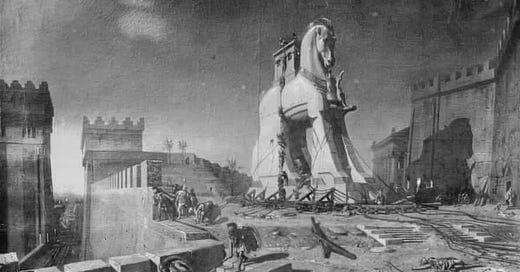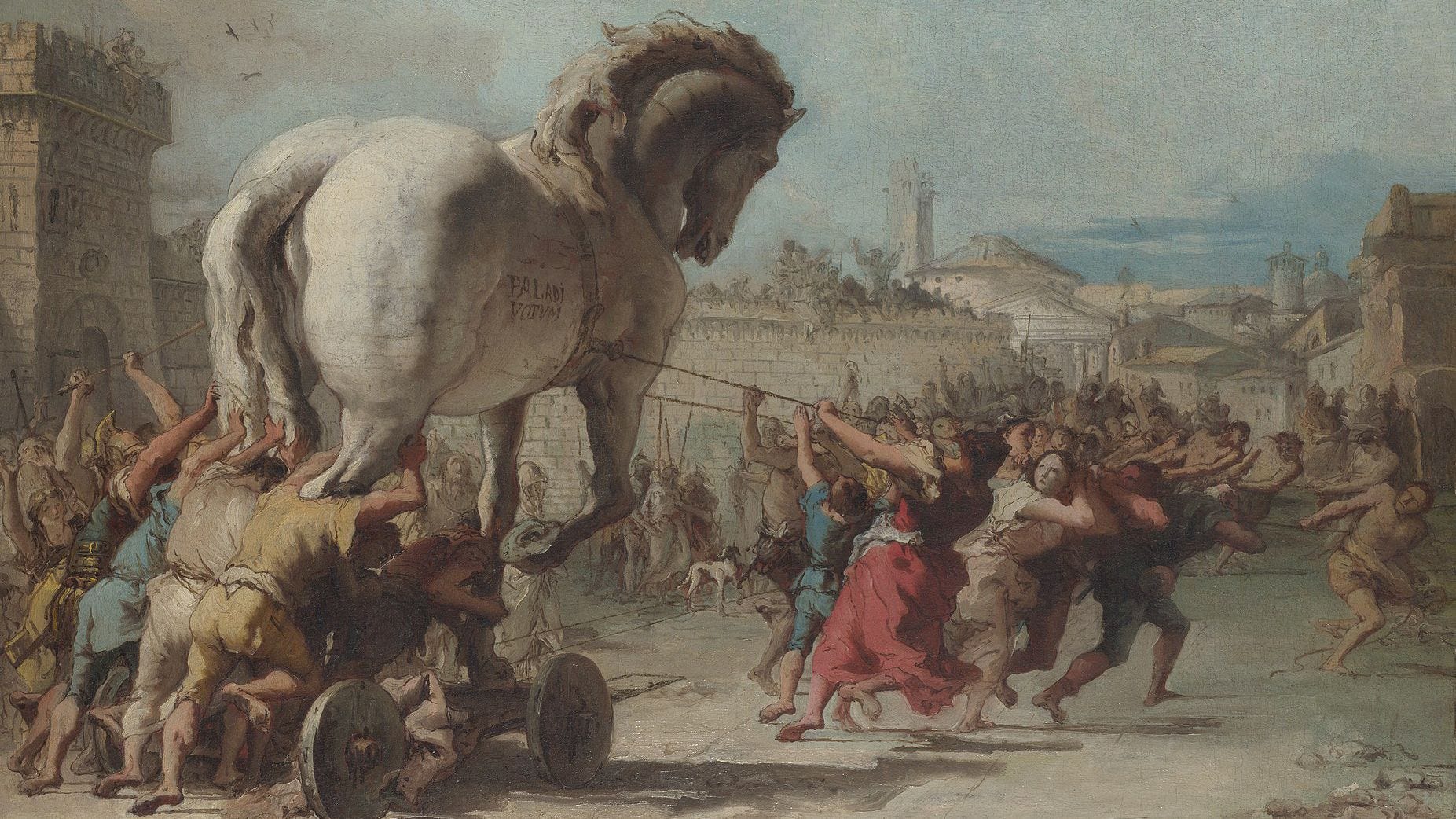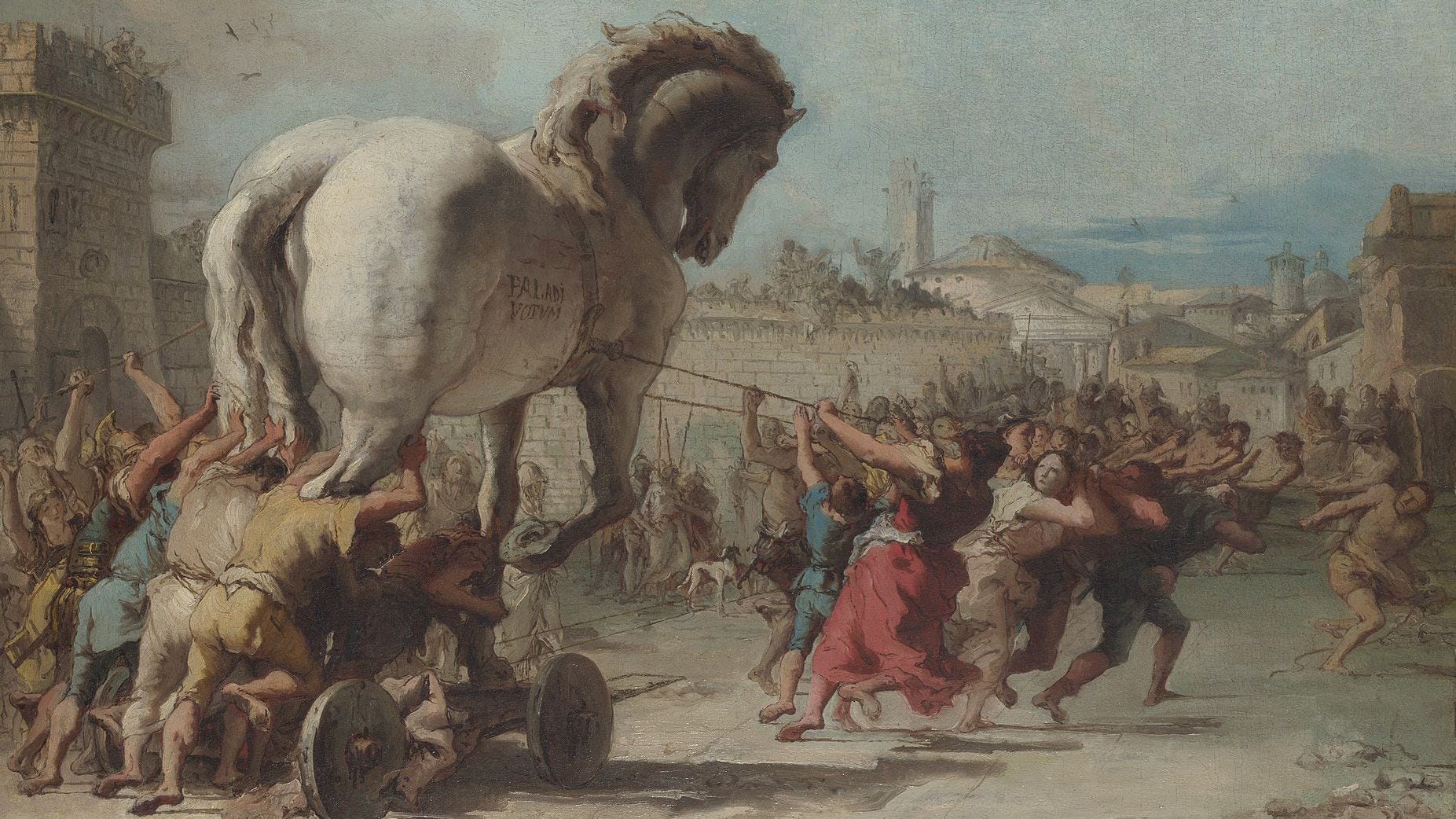The Seduction Of Troy
Troy in our weakness stands, not in her strength. - Ulysses
Defeated and deflated, with their soldiers threatening mutiny, the Greek Leaders were dumbfounded.
For 10 years, The Greeks had spent life after life in a failed attempt to bring down the walls of Troy. Moreover, Achilles, the most deadly of the Greek soldiers, had completely removed himself from the battlefield over a disagreement with management and perhaps out of love for Patroclus.
The Greek Leaders - Agamemnon the King of Mycenae, Nestor the Old, Ulysses the Wise, and Menelaus the younger King all met in an inversion of Plato’s Symposium.
In Plato’s Symposium, each of the orators like Aristotle and Aristophanes had to define the notion of Love. In this Council, on the other hand, the orators met to define the notion of victory.
Ulysses, in stark contrast to the rest of The Greek Council, said they needed to look at the man in the mirror if they ever wanted to leave Troy alive.
[an excerpt from Troilus and Cressida by Billy Shakes]
ULYSSES
Troy, yet upon his basis, had been down,
And the great Hector's sword had lack'd a master,
But for these instances.
The specialty of rule hath been neglected:
And, look, how many Grecian tents do stand
Hollow upon this plain, so many hollow factions.
When that the general is not like the hive
To whom the foragers shall all repair,
What honey is expected? Degree being vizarded,
The unworthiest shows as fairly in the mask.
The heavens themselves, the planets and this centre
Observe degree, priority and place,
Insisture, course, proportion, season, form,
Office and custom, in all line of order;
And therefore is the glorious planet Sol
In noble eminence enthroned and sphered
Amidst the other; whose medicinable eye
Corrects the ill aspects of planets evil,
And posts, like the commandment of a king,
Sans cheque to good and bad: but when the planets
In evil mixture to disorder wander,
What plagues and what portents! what mutiny!
What raging of the sea! shaking of earth!
Commotion in the winds! frights, changes, horrors,
Divert and crack, rend and deracinate
The unity and married calm of states
Quite from their fixure! O, when degree is shaked,
Which is the ladder to all high designs,
Then enterprise is sick! How could communities,
Degrees in schools and brotherhoods in cities,
Peaceful commerce from dividable shores,
The primogenitive and due of birth,
Prerogative of age, crowns, sceptres, laurels,
But by degree, stand in authentic place?
Take but degree away, untune that string,
And, hark, what discord follows! each thing meets
In mere oppugnancy: the bounded waters
Should lift their bosoms higher than the shores
And make a sop of all this solid globe:
Strength should be lord of imbecility,
And the rude son should strike his father dead:
Force should be right; or rather, right and wrong,
Between whose endless jar justice resides,
Should lose their names, and so should justice too.
Then every thing includes itself in power,
Power into will, will into appetite;
And appetite, an universal wolf,
So doubly seconded with will and power,
Must make perforce an universal prey,
And last eat up himself. Great Agamemnon,
This chaos, when degree is suffocate,
Follows the choking.
And this neglection of degree it is
That by a pace goes backward, with a purpose
It hath to climb. The general's disdain'd
By him one step below, he by the next,
That next by him beneath; so every step,
Exampled by the first pace that is sick
Of his superior, grows to an envious fever
Of pale and bloodless emulation:
And 'tis this fever that keeps Troy on foot,
Not her own sinews. To end a tale of length,
Troy in our weakness stands, not in her strength.
NESTOR
Most wisely hath Ulysses here discover'd
The fever whereof all our power is sick.
Enemy at the Gates
2000 years ago, the leaders of Troy made a fatal mistake.
The fatal mistake that the Trojans made was that they mistook a poison pill as a peace offering.
Ulysses, the wisest of the Greeks, had failed over and over and over again to destroy the well-fortified Trojan walls. Time and time again, the Greek siege machines proved no match for the towers and the pitch and the traps the Trojans laid for the Greeks in waiting.
So, Ulysses (the Greeks called him Odysseus) tried the complete opposite strategy: instead of fighting the Trojans and trying to tear down their walls, Ulysses decided to fashion the most elaborate peace offering ever made: the Trojan Horse.
The God of the Sea, Poseidon, favoured the Trojans. As such, the patron animal of Troy was a horse. Ulysses ordered the fashioning of a beautiful, huge horse made entirely of wood. Then, he told all of the Greeks to undock their ships so that the Trojans would believe that the Greeks had finally given up.
That morning, the Trojans woke up to see the Greeks ships disappeared and a single, large, elaborate wooden horse standing at the foot of their walls.
They rejoiced! The Greeks had finally given up enough blood to leave the shores of Troy and head back home.
As they rejoiced, the Trojan gates were opened, and the peace offering was carted inside the city walls.
That evening, the rejoicing met with feast, dancing, and debauchery. That night, when everyone was fast asleep, the Greeks opened the latch of the Trojan Horse and quietly streamed out, one by one. A few hours later, Phobos the Greek God of Panic swept the battlefield and saw Helen thrown from the top of the tower to her death; Discord sighed.
Why didn’t Troy simply return Helen to the Greeks instead of risking their entire civilization?
Enter Troilus. Troilus drops the mic when he tells Hector and the rest of the Occam’s Razor Cult that it’s way too late to give up Helen; The Greeks are going to die trying to regain what they own.
[An excerpt from Troilus and Cressida]
TROILUS
I take to-day a wife, and my election
Is led on in the conduct of my will;
My will enkindled by mine eyes and ears,
Two traded pilots 'twixt the dangerous shores
Of will and judgment: how may I avoid,
Although my will distaste what it elected,
The wife I chose? there can be no evasion
To blench from this and to stand firm by honour:
We turn not back the silks upon the merchant,
When we have soil'd them, nor the remainder viands
We do not throw in unrespective sieve,
Because we now are full. It was thought meet
Paris should do some vengeance on the Greeks:
Your breath of full consent bellied his sails;
The seas and winds, old wranglers, took a truce
And did him service: he touch'd the ports desired,
And for an old aunt whom the Greeks held captive,
He brought a Grecian queen, whose youth and freshness
Wrinkles Apollo's, and makes stale the morning.
Why keep we her? the Grecians keep our aunt:
Is she worth keeping? why, she is a pearl,
Whose price hath launch'd above a thousand ships,
And turn'd crown'd kings to merchants.
If you'll avouch 'twas wisdom Paris went--
As you must needs, for you all cried 'Go, go,'--
If you'll confess he brought home noble prize--
As you must needs, for you all clapp'd your hands
And cried 'Inestimable!'--why do you now
The issue of your proper wisdoms rate,
And do a deed that fortune never did,
Beggar the estimation which you prized
Richer than sea and land? O, theft most base,
That we have stol'n what we do fear to keep!
But, thieves, unworthy of a thing so stol'n,
That in their country did them that disgrace,
We fear to warrant in our native place!
Have I Not Tarried?
There’s a hilarious exchange when Troilus is complaining to Pandarus that the beautiful Cressida isn’t entreating his virile advances. Troilus keeps telling Pandarus how much he’s tried, and Pandarus’ reply cooks him.
PANDARUS
Well, I have told you enough of this: for my part,
I'll not meddle nor make no further. He that will
have a cake out of the wheat must needs tarry the grinding.
TROILUS
Have I not tarried?
PANDARUS
Ay, the grinding; but you must tarry
the bolting.
TROILUS
Have I not tarried?
PANDARUS
Ay, the bolting, but you must tarry the leavening.
TROILUS
Still have I tarried.
PANDARUS
Ay, to the leavening; but here's yet in the word
'hereafter' the kneading, the making of the cake, the
heating of the oven and the baking; nay, you must
stay the cooling too, or you may chance to burn your lips.







